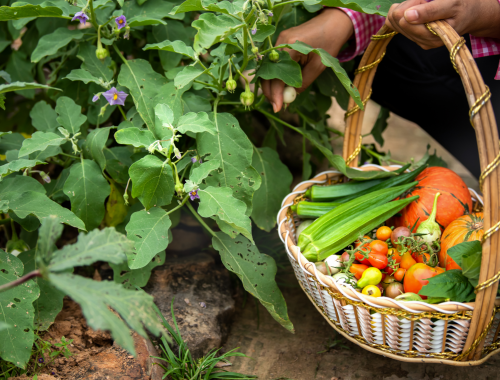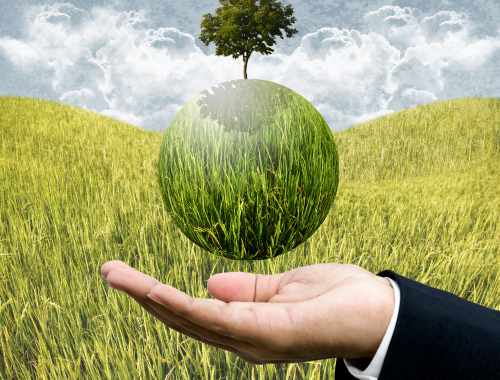Difference Between Organic Farming and Sustainable Agriculture
Organic farming is an agricultural system that does not use synthetic pesticides and fertilizers. Sustainable farming refers to agricultural techniques that aim to preserve the natural resources of the soil. Sustainable farming practices aim to augment the organic matter in the soil, reduce soil erosion and preserve the carbon content of the ground.

What is organic farming?
Definition:
Organic farming is an agricultural system that makes use of natural pesticides, biological fertilizers, and environmentally friendly methods of disease control.
Characteristics:
Organic farming avoids the use of synthetic pesticides and fertilizers and relies only on natural methods of growing crops. Genetically modified organisms are not involved in this farming method. Ecologically balanced principles of growing crops are relied upon, and these include green manure, organic waste, natural pesticides, and crop rotation. Only fertilizers and pesticides with natural ingredients are considered permissible in organic farming.
Features:
The main features of organic farming include improving soil quality via the use of organic manure, using soil microorganisms to enrich the crop nutrients, nitrogen fixation through legumes, pest control through natural pesticides, better livestock, and crop output, and conservation of the natural habitat.
Benefits:
Organic foods have several benefits. These crops are enriched with nutrients since the organic soil passes down its nutrients to the plants. These foods keep us healthy as they are devoid of harmful chemicals. These crops are free of poisonous chemicals of pesticides. Organic foods are much cheaper as the price of synthetic pesticides and fertilizers is subtracted from production costs. Also, their taste is enhanced, and their shelf life is much longer, enabling storage.

What is sustainable agriculture?
Definition:
Sustainable farming refers to agricultural techniques that aim to preserve the natural resources of the soil. Sustainable farming practices aim to augment the organic matter in the soil, reduce soil erosion and preserve the carbon content of the ground.
Characteristics:
Sustainable agriculture incorporates key ecological processes such as nutrient cycling, and nitrogen fixation to produce high-quality crops. It aims at using reduced amounts of unsustainable, nonrenewable agricultural inputs. It also promotes self-reliance in farmers as they tackle problems in the field such as trickle irrigation on their own. This method basically tends to conserve soil and water during farming.
Features:
Features of sustainable agriculture include decreased tillage on fields, reduced soil erosion by planting cover crops, nitrogen application through spring or split to maximize the fertilizer efficacy, efforts to reduce herbicide use, and implementation of buffer zones like grass waterways to prevent erosion and conserve nutrients.
Benefits:
The main aim of sustainable agriculture is the conservation of environmental resources. It helps prevent pollution and keeps biodiversity alive. It reduces the cost of conventional methods of farming. It promotes good crop outcomes which profits the farmers economically.
Difference between organic farming and sustainable agriculture
Definition:
Organic farming is an agricultural system that does not use synthetic pesticides and fertilizers. Sustainable farming refers to agricultural techniques that aim to preserve the natural resources of the soil.
Characteristics:
Organic farming avoids the use of synthetic pesticides and fertilizers. Genetically modified organisms are not involved in this farming method. Ecologically balanced principles of agriculture are used which include green manure, organic waste, natural pesticides, and crop rotation.
Sustainable agriculture tends to conserve soil and water during farming. It incorporates key ecological processes such as nutrient cycling, and nitrogen fixation to produce high-quality crops. It aims at using reduced amounts of unsustainable, nonrenewable agricultural inputs. It also promotes self-reliance in farmers.
Features:
The main features of organic farming include improving soil quality via the use of organic manure, using soil microorganisms to enrich the crop nutrients, nitrogen fixation through legumes, pest control through natural pesticides, better livestock, and crop output, and conservation of the natural habitat.
Features of sustainable agriculture include decreased tillage on fields, reduced soil erosion by planting cover crops, nitrogen application through spring or split to maximize the fertilizer efficacy, efforts to reduce herbicide use, and implementation of buffer zones like grass waterways to prevent erosion and conserve nutrients.
Benefits:
Organic farming has several benefits. These crops are enriched with nutrients. They are devoid of harmful chemicals and have good nutritional value. These crops are free of poisonous chemicals of pesticides. Organic foods are much cheaper. Also, their taste is enhanced, and their shelf life is much longer, enabling storage.
The main aim of sustainable agriculture is the conservation of environmental resources. It helps prevent pollution and keeps biodiversity alive. It reduces the cost of conventional methods of farming. It promotes good crop outcomes which profits the farmers economically.
Table of differences between organic farming and sustainable agriculture

FAQs
How organic farming is different from sustainable agriculture?
Organic farming is an agricultural system that does not use synthetic pesticides and fertilizers. Sustainable farming refers to agricultural techniques that aim to preserve the natural resources of the soil.
What is the relationship between organic farming and sustainable development?
Organic farming is based on using harmless natural inputs to the soil such as no pesticides, and no herbicides. Sustainable agriculture is focused on physical input to the field such as no-tillage, and the use of cover crops.
Is organic farming sustainable or not?
Yes. In the long run, organic farming would be a more sustainable form of agriculture as it produces nutritious, chemical-free produce.
Are sustainable and organic synonyms in agriculture?
No. Not all forms of organic farming are sustainable.
What are the concepts of organic farming and sustainable agriculture?
Organic farming is an agricultural system that does not use synthetic pesticides and fertilizers. Sustainable farming refers to agricultural techniques that aim to preserve the natural resources of the soil.
Why is it that organic farming is considered the key to sustainable agriculture?
Organic farming uses natural manure which cultivates more fertile soil. Less energy is used in organic farming and the carbon content of the soil is conserved. This is how organic farming is a key to sustainable agriculture.
What is the main purpose of sustainable agriculture?
Sustainable farming practices aim to augment the organic matter in the soil, reduce soil erosion and preserve the carbon content of the ground.
- Differences Between Reptiles and Amphibians - May 17, 2024
- Difference Between Ophthalmology and Optometry - May 15, 2024
- Difference Between Fear and Anxiety - April 2, 2024
Search DifferenceBetween.net :
Leave a Response
References :
[0]Lampkin, Nicolas, Susanne Padel, and Carolyn Foster. "Organic farming." CAP regimes and the European countryside: prospects for integration between agricultural, regional and environmental policies.. Wallingford UK: CABI Publishing, 2000. 221-238.
[1]Reddy, B. Suresh. "Organic farming: status, issues and prospects–a review." Agricultural Economics Research Review 23.347-2016-16927 (2010): 343-358.
[2]Reganold, John P., Robert I. Papendick, and James F. Parr. "Sustainable agriculture." Scientific American 262.6 (1990): 112-121.
